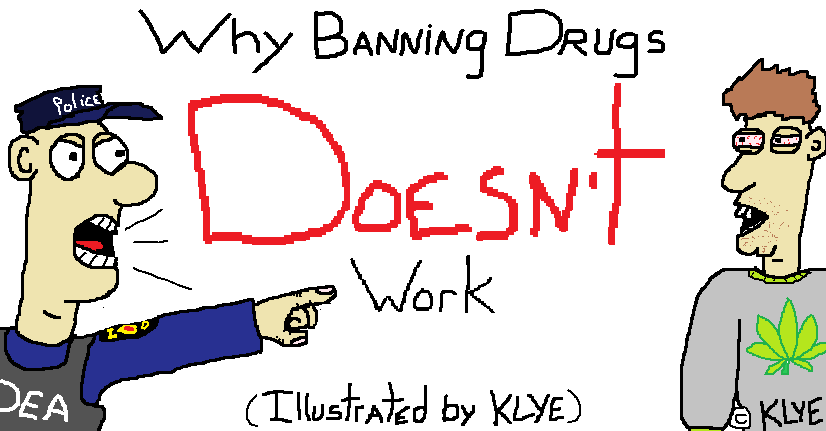Introduction
This is a reworking of one of my early posts that didn't get much attention.
I think this is because for one thing I posted this after a period of inactivity and secondly I posted it at the absolute worst time. I have had a number of people come across it and ask me to repost it.
It took me quite some time to compose and so I was disappointed that not many people read it.
Given the fact that we have had users like @charlieshrem and the mother of Ross Ulbricht @rossulbricht join on his behalf recently I think the opinions expressed here are even more relevant.
These are both people who have been persecuted to what many feel is an unreasonable extent for issues relating to the (frankly) insane laws surrounding drugs and governmental attempts to control them and make an example of anyone who does not fall into line with their policies.
Since the original post there have also been major discussions in the UK on legalising cannabis for medical use. It seems the decriminalisation of cannabis in some US states has reopened the discussion - I have a little more information on this in the "Updates"section.
I have therefore decided it to update it and give it more of a fun feel with some commissioned artwork from @klye to make it easier to read.
The drugs issue is one that many people are aware of and can see the hypocrisy of but it is felt that this is something that will never change.
I will try to keep this brief and readable - at a future time I may do a more academic style post with full references and the like but I am intending to use this to start the discussion and put across things as I personally see them.
NB: I am not advocating anyone break the law or laws in their own country. I am merely wanting to point out the inadequacies of the current legislation. This is not an endorsement for taking drugs or breaking the law.
A Bit of History
Since the dawn of humanity and possibly going back even further human beings have used substances from plants, animals and other sources to alter their conscious state.
In primitive societies the medicine men/women or shamans were held in high regard and used psychedelic substances such as psilocybin, peyote and ayahuasca to commune with their Gods, gain insight and basically connect with the world outside themselves.
The perception that mind-altering substances are inherently "bad" or even "evil" is something that has developed relatively recently. In the late 19th century it was common to use laudanum as a remedy for children (laudenum contains opiates) who were having trouble sleeping.
Cocaine was intitially considered a health remedy - one of the reasons why early recipes for famous Colas like Coca-Cola and Pepsi contained it.
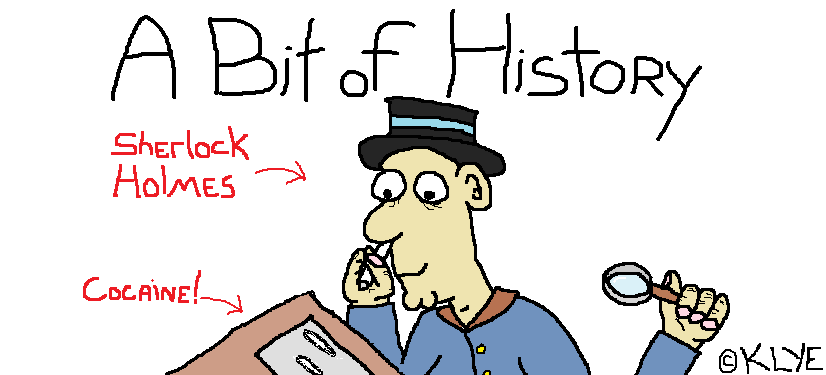
This was also reflected in literature as Sir Arthur Conan Doyle (himself a physician who may well have partaken in recreational drug use) made Sherlock Holmes a frequent user of drugs like cocaine and morphine (although he ironically was critical of opium use due to the politics of the time- look up the 1st and 2nd Opium War).
The perception of selected mind-altering substances being harmful emerged gradually throughout the 20th century and was often associated with certain members of society who were marginilised such as prostitutes, foreigners and the poor.
This resulted in instances of "moral panic" where it was believed that drugs were agents of immorality.
Cannabis/marijhuana had been used for Millenia in many societies throughout the world both to treat illness and for it's spiritual properties.
It only really started to be demonised in the early 20th century and there is a some suggestion at least that this was done as a means of promoting certain business interests.
The hemp plant (fibrous part of cannabis) has many uses both as a material in addition to it's potential as a pharmaceutical drug.
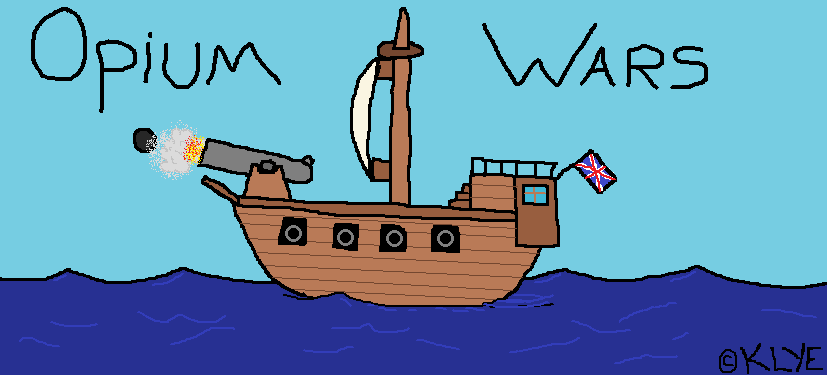
The pharmaceutical uses are becoming better known thanks to people with chronic health problems who have fought long and hard to have access to what they see as an essential treatment.
The recent legalisation of marijhuana in certain US states has lead to an acceleration in research into the health benefits.
The 1950s and 60s gave birth to an explosion of drugs that had psychedelic or mind expanding effects.
The most well known is LSD (first discovered in 1938).
These became associated with the counter-culture movement of the 1960s and seemed to have been made illegal out of fears that they were at least partly responsible for these kinds of movements and that their continued use might lead to civil unrest.
This atmosphere lead to the current situation of drug prohibition with a number of United Nation's Conventions in addition to national policies which were instituted throughout the 1960s, 1970s and 1980s. (There is a nice summary of some of these here.)
The often used term of the "War on Drugs" comes from a 1971 press conference by then United States President Richard Nixon.
Why banning drugs doesn't work
1) People will take them anyway or find alternatives
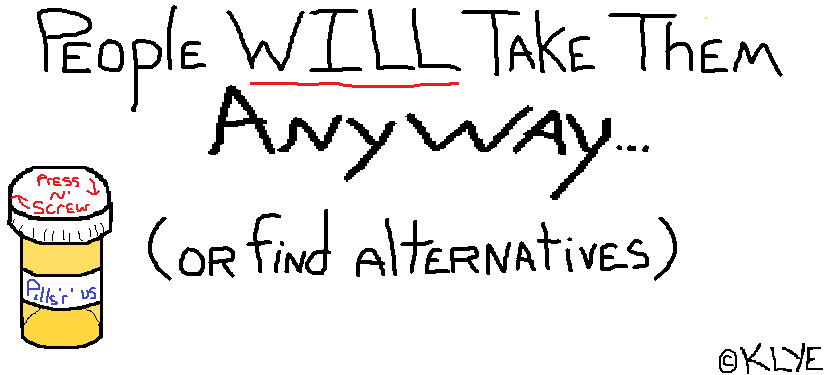

People have always used mind altering substances and they always will. There is a natural biological drive to do it.
Further some substances e.g. those derived from cannabis have shown benefit to people with chronic conditions which have otherwise failed to be treated with conventional "legal" medication.
If people will seek out illegal substances for recreational purposes it is even more likely that they will do so to treat a crippling disease which destroys their quality of life.
2) It stifles research and impairs quality of life
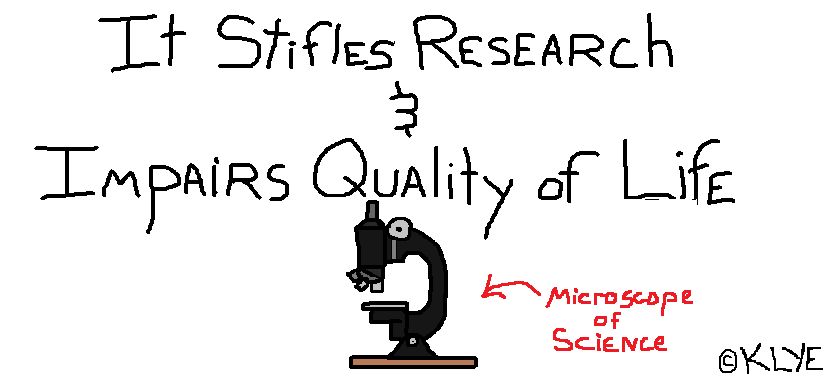
As another example of this I have encountered cases where people with severe, life- limiting Parkinson's disease have been using MDMA to medicate their condition.
It has in some cases led (temporarily) to a complete absence of symptoms - a remarkable transformation - indeed this was illustrated quite starkly in a BBC "Horizon" documentary several years ago.
Unforutunately this has not been given the attention or research time it deserves because MDMA is illegal in most countries and it is considered difficult to get the appropriate licenses, not to mention expensive, controversial and not cost effective from a potential profit standpoint.
More recently there is preliminary research which indicated that psychedelic drugs such as LSD might be of benefit in a whole range of conditions potentially even offering cures for diseases such as depression, addictions and PTSD.
There is also some indication that they may be of benefit in terminal illness. Some of these findings are summarised here in Wikipedia (some of the actual papers require academic access or a subscription - this literature review is free though).
There is also considerable evidence that cannabis could be useful for treating a number medical conditions.
Despite there being considerably more research into cannabis as a treatment versus other illicit drugs, one can conclude that it's illegality has still inhibited research and further impaired the quality of lives of those in countries where it still criminalised. (Please see the "Updates" section for some more information on this.)
The recent trend of copycat "legal" highs (which) have made a mockery of many legal systems have often lead to people using substances which are poorly understood and can get around conventional tests.
It can also leave medical services unsure of how to treat patients who present under the influence of such substances.
3) It funds criminals and terrorists
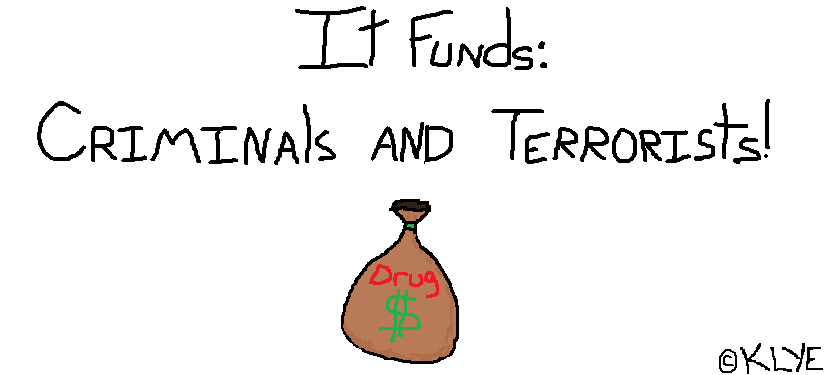
This is pretty obvious. If something is illegal criminals will step in to take over the market and fill the vacuum.
Not only is it obvious from simple economics but this has been seen numerous times with banning things in the past.
The most direct example would be the prohibition of alcohol in the US in the 1920s and it's role in the rise of organised criminals.
It is also interesting that certain government intelligence agencies have ben accused of using drugs to pay for their "off the record" operations.
It makes sense that if you want to do something that you want to keep secret you might consider more unorthodox methods to fund it and hence keep it more secret by removing the money trail created by more conventional business operations.
These days one can add another potential group of criminals who might use drugs to fuel their criminal activities for this very reason and that is terrorists.
4) It puts people's lives in the hands of those same criminals
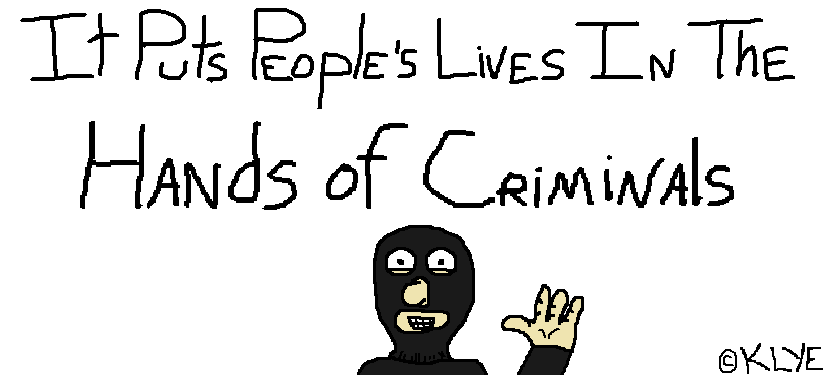
Whilst a lab producing a pharmaceutical grade drug is tightly regulated and rightly cares whether the substance they are giving to you is correct and in the right dosage - a criminal doesn't necessarily have those same concerns.
This is one of the reasons why people often overdose on drugs like heroin - often the heroin is diluted or adultered in some way giving people a false impression of the dose they need to take.
Then if a new batch comes on the market that is of a higher strength than usual it can result in people suffering overdoses due to mistakenly taking too much.
In the 1980s, a batch of a designer drug (MPPP) ended up causing a number of teenagers and young adults to develop Parkinson's Disease after a single dose which was contaminated with a neurotoxin (MPTP). (See "The Case of the Frozen Addicts" by Langston)
5) It treats adults like children and can make drugs more attractive
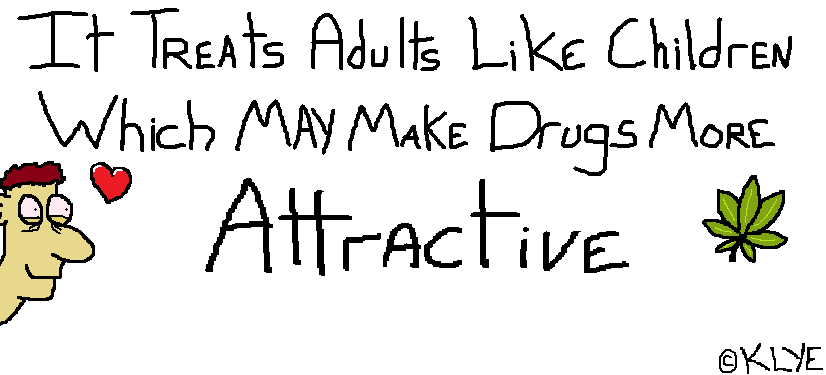
If an adult chooses to put a substance into their body knowing the full risks then surely in a civilised and free society that is their choice.
- The same way that it is their choice if they decide to eat 3 cheeseburgers in a row or drink half a bottle of vodka.
If anything telling people not to do something can have the opposite effect and make that particular activity more attractive as a form of rebellion against the system.
It also gives the wrong message that somehow legal drugs like alcohol and tobacco are somehow safer and less dangerous than the illegal ones - which is not true at all.
One of the arguments used by those who are morally opposed to drugs is that simply allowing people to take drugs would lead to an inevitable collapse of society with everyone ending up being hopelessly addicted to hard drugs.
Well we already have two drugs which are near universally available, legal and are known (indeed proven) to have the same addiction and abuse potential as the hardest illegal drugs i.e. alcohol and tobacco.
Whilst there are some people who become alcoholics and chain smokers, unable to live their regular lives anymore - they are a tiny minority.
Although the harm done to the minority who are affected can be severe -society has yet to collapse as a result. There is no reason to assume that it would be any different with other drugs.
6) It can stifle art and creativity
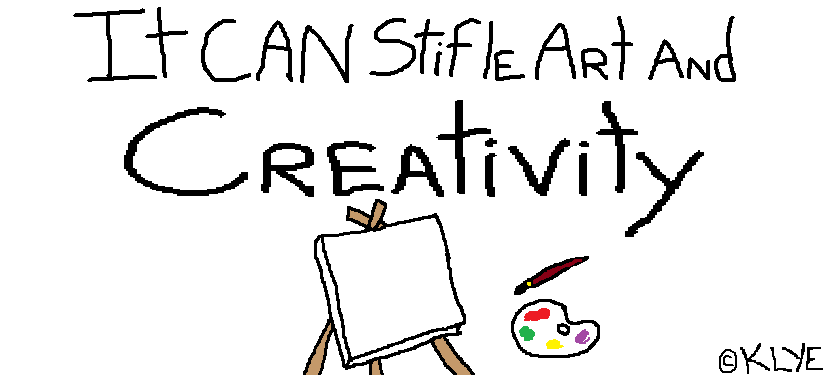
This is probably going to be considered a very controversial point.
Some of the greatest art we have has been created under the influence of mind-altering substances.
Vincent Van Gogh was alleged to have been partial to Absinthe (an alcoholic drink which contains wormwood - a natural psychotropic agent).
Obviously like the case of Van Gogh a lot of this is under the influence of legal substances such as coffee and alcohol but there is a substantial amount that we have thanks to the possible effect of the less legal ones too.
I won't go into specifics as I don't want to make accusations or slander anyone. Neither do I want anyone to give the impression that I'm condoning the use of illicit substances for this purpose.
I'm merely pointing out something that is well known and in some cases openly admitted by some musicians, artists, creatives and even scientists.
It would be intellectually dishonest to pretend that his is not the case.
They may even have helped in the discovery of DNA. (Note this has never been confirmed and is a matter of some debate).
7) It is a lost source of jobs, enterprise and tax revenue
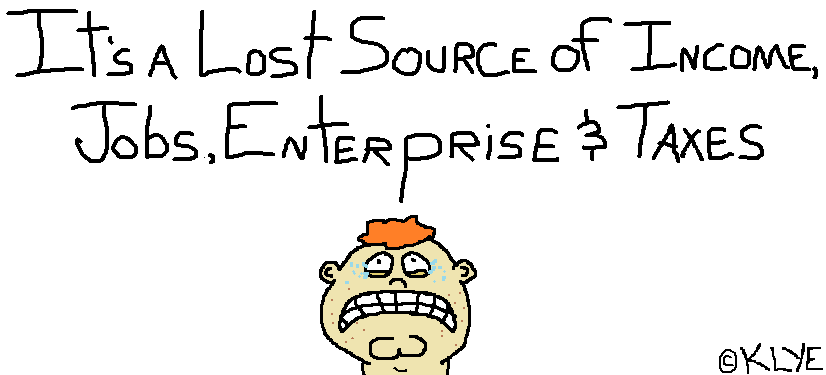
These are all obvious things and should be "music" to the ears of most governments.
You could have a whole industry of new businesses, creating new jobs and all of them paying extra tax on top of that.
Just look at what is happening in places like Colorado.
Plus you wouldn't have to lock so many people up or drug related crime, so you can build fewer prisons, reduce crime and reduce your policing costs.
The extra money you save could be used to treat people who develop harmful addictions and other related health or social problems.
8) It protects monopolies and vested interests
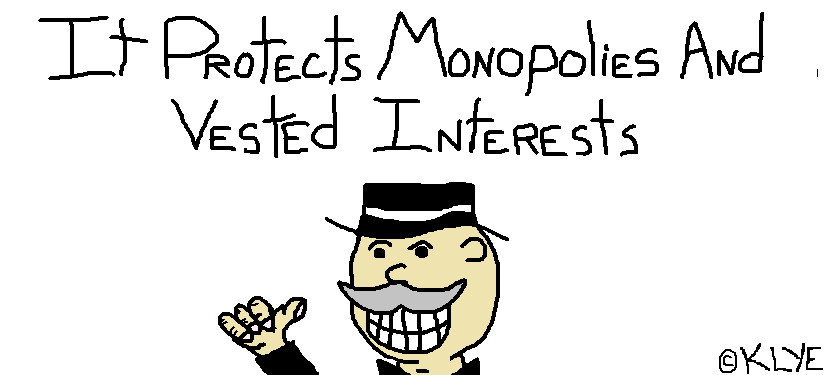
The example of hemp/cannabis being banned in the US would be an example of this.
There is the belief that much of the impetus for banning hemp/cannabis in the early 20th century came from powerful people like media magnate William Randolph Hearst who were more concerned about it's potential uses as an alternative to paper and the competition that would provide to their businesses than any moral or health reasons.
One must also consider the effects of legalising drugs which might offer better treatments or even cures for chronic diseases such as depression, PTSD etc.
These illnesses are a source of enourmous profits for pharmaceutical companies. A natural (unpatentable) alternative could have a significant impact on their profits.
Further most artificial drugs which are illegal (like MDMA) are no longer under patent and are very cheap to produce. Legalisation would provide a low cost alternative and competition to drugs which are under patent and cost a lot of money to develop.
It is not surprising that there would be some resistance to this from certain quarters who would be interested in protecting their profits.
9) It discriminates against certain minority groups and spiritual beliefs
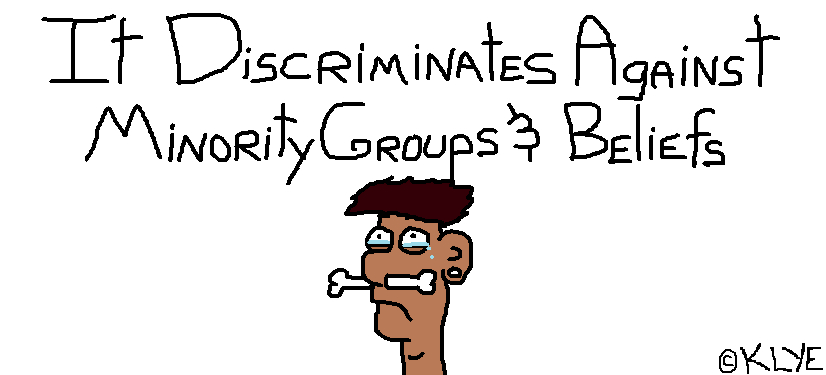
Many religious and cultural groups also use psychotropic substances and the illegality or banning of such substances can be seen as a form of discrimination.
A good example would be the use of cannabis by Rastafarians and the use of psychedelics by certain native tribes.
One can also look at the resurgence in interest in Shamanism and travel to South America to partake in Ayahuasca ceremonies - something which is considered a part of the spiritual beliefs and culture of the native peoples of these regions.
This is also demonstrated by the recent outlawing of Khat in the UK which was used by people from certain African and Middle Eastern communities.
It has not only had an impact on some of the communities where it was grown (economically) but also outlawed what was seen by many as a relatively harmless substance for what seem like purely political reasons and general ignorance.
In some regards this can be seen as a form of cultural imperialism which further erodes the rights of indigenous cultures and accelerates the loss of ancient belief systems.
Updates:
In the last few days in the UK (13th September 2016) the "All Party Parliamentary Group on Drug Reform" has released a report discussing the medicinal value of cannabis and the current refusal to acknowledge this entitled "Accessing Herbal Cannabis: Meeting Patient’s Needs" and an associated evidence review called "Cannabis: The Evidence for Medical Use".
I haven't had a chance to look at these in any depth yet but they have been getting a lot of publicity.
Here is a quote from one of the group (taken from their website):
According to Baroness Molly Meacher, co-chair of the All Party Parliamentary Group, ‘The findings of our inquiry and review of evidence from across the world are clear. Cannabis works as a medicine for a number of medical conditions. The evidence has been strong enough to persuade a growing number of countries and US states to legalise access to medical cannabis. Against this background, the UK scheduling of cannabis as a substance that has no medical value is irrational.’
Hopefully this is a sign of coming change and rational discussion of the subject in the UK.
Conclusions
I hope this is food for thought and that this post hasn't been overly long or difficult to read.
I would also like to apologise for any obvious points I have missed or forgotten as well as any typographical errors or grammatical mistakes I have failed to pick up on.
I would like to make it clear that I personally do not condone the use of illicit drugs or illegal substances and I do not take them myself.
There are substantial risks to mental and physical health that make this a very risky thing to do.
I do urge everybody to educate themselves and if they absolutely must take illegal drugs to take all the safety precautions that they can.
There are a number of government initiatives/websites which aim to help educate people. (e.g. Frank.)
My main intention here was to point out why the current system doesn't work and why I believe the philosophy of prohibition itself is inherently flawed and ends up causing more harm than good.
Please get involved in the discussion below.
If you like my work please follow me and check out my previous posts on science, photography and a variety of other topics @thecryptofiend - hope you enjoy.
Image credits: All images are by @klye. Please check out "A Guide to Commissioning Artwork from KLYE" for more information.

